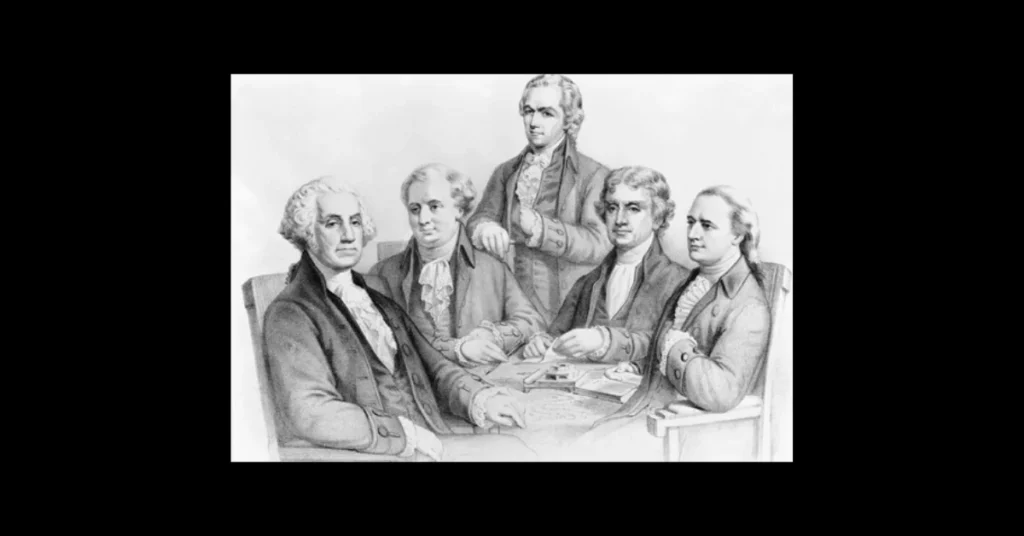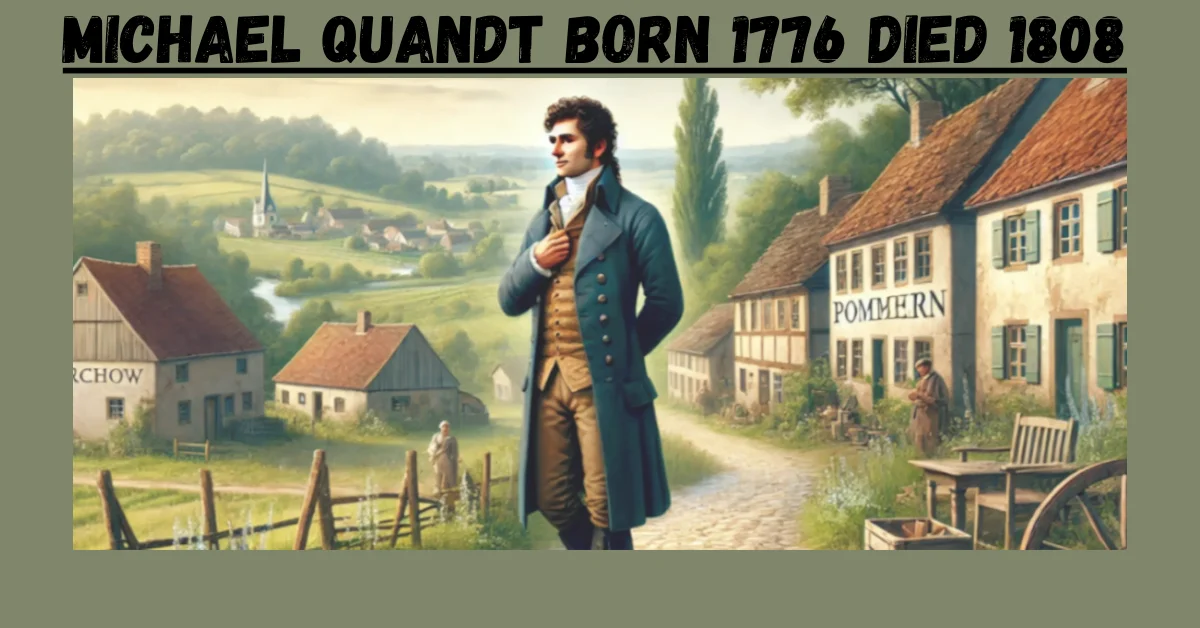Michael Quandt, born in 1776 and passing in 1808, remains a fascinating yet little-known figure in the historical landscape of Prussia’s Pommern region, an area that is now part of modern Poland. His story offers a glimpse into life in a rural, agrarian society under Prussian rule, providing valuable insights into the social, economic, and political elements that shaped daily life in late-18th-century Europe.
Michael Quandt Early Life in Wurchow, Pommern
Michael Quandt was born in 1776 in Wurchow, a small town located in the Pommern region of Prussia, now part of modern-day Poland. At that time, Pommern (Pomerania) was a crucial area for Prussia, located along the Baltic Sea, with a population heavily influenced by Germanic and Slavic cultures. Wurchow itself was a rural village, characterized by its agricultural landscape and deeply rooted in the traditions of farming and trade.
The late 18th century was a period of significant political change in Europe, particularly in the territories that made up the Prussian state. Michael Quandt was born into a world that was affected by the growing influence of Enlightenment ideals, social reforms, and the economic demands of the time. His family, like many in Pommern, likely lived a humble life, focused on agricultural work and community participation. Understanding his early years is essential to understanding his place in history.
The Cultural and Political Climate of Pommern in 1776
Pommern was a melting pot of Germanic and Slavic influences, impacted by Prussian administrative policies that encouraged productivity, discipline, and loyalty. Understanding Michael Quandt’s formative years requires a grasp of these factors, which likely instilled a sense of identity, resilience, and duty within him.
Life Under Prussian Rule
Living under Prussian authority meant experiencing direct influences of King Frederick the Great’s policies, aimed at strengthening the state through social structure, education, and military service. Many residents, including young Michael, would have been familiar with the strict societal expectations that Prussia imposed, where community roles and responsibilities were emphasized over individualism.
The Quandt Family and Social Standing
Though much of Michael Quandt’s early life details remain unclear, historical records indicate that his family might have had ties to the farming community. The Quandt surname itself has historical significance, as it appears in multiple records across Germany and Poland, particularly among families involved in agriculture, trade, and local governance.
In 1791, Michael Quandt married in Rathsdamnitz, another village in the Stolp region of Pommern. Marriage at a young age was not uncommon at the time, especially in rural regions where social structures revolved around family, community, and working the land. By marrying at the age of 15, Michael would have taken on responsibilities as a head of his household, further cementing his role within his community.
Family and Lineage: The Quandt Legacy

Quandt’s family background is integral to understanding his role in society. In Pommern, family lineage and social standing were significant factors in shaping a person’s identity. The Quandt family, though likely modest in economic terms, would have held a strong presence within the community.
Family Roles and Heritage
The concept of family in 18th-century Prussia was rooted in traditional roles. Men like Michael were expected to assume responsibilities in agricultural labor, local administration, or as guardians of the family’s wellbeing. The emphasis on family and heritage created a continuity that individuals like Michael were expected to uphold.
Possible Marriage and Offspring
It is probable that Michael Quandt married and possibly fathered children. Family records and local registries, if preserved, could provide further insight into his descendants and their roles in continuing the Quandt legacy in Pommern.
Read More: sunil cherti fc24
Pommern in the 18th Century: A Historical Overview
To understand the world Michael Quandt was a part of, it’s important to consider the broader context of Pommern and Prussia during this time. Pommern was under the rule of the Kingdom of Prussia, one of the most powerful states in Europe. The region was strategically important because of its access to the Baltic Sea and its role in trade and military positioning. The 18th century saw Prussia rise as a major European power under Frederick the Great, who reigned from 1740 to 1786. By the time Michael Quandt was born in 1776, Pommern had already undergone significant changes, including population shifts due to wars, economic developments, and territorial disputes. The area was still recovering from the devastation of the Seven Years’ War (1756-1763), which left many rural areas in hardship.
Challenges of Rural Life: Understanding Quandt’s Community
Living in rural Pommern during the late 18th century meant enduring many hardships, from harsh winters to political instability. Farming was the backbone of the economy, and the majority of the population worked the land, either as owners or laborers. Families like Michael Quandt’s likely relied on subsistence farming, meaning they grew enough to feed themselves with little surplus for trade.Social life in Wurchow and other nearby villages revolved around the church, local governance, and community activities. The Lutheran church, which had a strong presence in Pommern, likely played an essential role in Quandt’s life. Churches were not only places of worship but also served as hubs for education, social gatherings, and community support.
Pommern During a Period of European Upheaval
While Michael Quandt led his life in Wurchow, Europe was undergoing dramatic transformations. Between 1776 and 1808, several events would have influenced Prussia and its territories, indirectly affecting Michael’s life in Pommern.
The American and French Revolutions’ Impact
The American Revolution (1775–1783) and the French Revolution (1789–1799) sent ripples across Europe. Although distant, these events inspired thoughts on governance and individual rights, which may have slowly permeated Prussian society and influenced Michael’s views on authority.
The Napoleonic Wars and Prussian Reforms
From 1803 to 1815, the Napoleonic Wars shook Europe, causing significant losses and necessitating reforms. Although Michael died in 1808, before the full impact of these wars reached Prussia, his later years would have been marked by the rising tensions and economic strains the conflicts imposed on local communities.
The Death of Michael Quandt in 1808: A Time of Uncertainty
Michael Quandt’s life came to an early end in 1808, a time of great uncertainty in Europe. The Napoleonic Wars (1803–1815) were raging across the continent, and Prussia had suffered devastating defeats at the hands of Napoleon’s forces. In 1806, Prussia was defeated at the Battle of Jena-Auerstedt, leading to the occupation of Prussian territories by French forces. Pommern was deeply affected by these events, with villages and towns facing occupation, conscription, and the economic strain of war.
Although there is no direct evidence that Michael Quandt was involved in the Napoleonic Wars, his death in 1808 occurred during a period of intense military conflict and social upheaval. The local economy would have been strained by the demands of supporting armies, and many young men were conscripted to fight in Napoleon’s wars. Even those who remained in rural areas faced hardship due to food shortages, disrupted trade routes, and the collapse of local markets.
Legacy and Historical Significance
Michael Quandt’s life encapsulates the experiences of rural Prussian citizens during a time of intense transformation. Though he did not witness the full reforms that Prussia would later undergo, his life represents the traditions and values that were the foundation for these changes. Through the historical lens, his journey embodies the resilience of the Pommern people and their adaptability to political shifts, family commitments, and societal expectations.
FAQs
Who was Michael Quandt?
Michael Quandt was a rural Prussian born in 1776 in Wurchow, Pommern (now part of Poland), who lived through a period of significant political and social change in Europe, passing away in 1808.
What was life like in Pommern during the late 18th century?
Pommern was a region under Prussian rule, characterized by an agrarian society, military discipline, and the influence of Enlightenment ideals, with agriculture being the backbone of the economy.
How did the Napoleonic Wars affect Michael Quandt’s life?
Although Quandt passed away in 1808, during the Napoleonic Wars, the economic and social hardships brought on by the wars would have impacted his community, including food shortages and military conscription.
What role did family play in Michael Quandt’s life?
Family was central in 18th-century Pommern. Michael married young and likely took on significant responsibilities as a head of his household, with family roles deeply tied to agricultural labor and community leadership.
What legacy did Michael Quandt leave behind?
Though little is known about his personal achievements, Michael Quandt represents the resilience of rural Prussian citizens and the continuity of family traditions in the face of political and societal upheavals.
In The End
Michael Quandt’s life, though largely unrecorded, offers valuable insights into rural Prussia during a period of significant transformation. Born in 1776 in Pommern, he navigated the challenges of agrarian life under Prussian rule and witnessed the early stirrings of political upheaval in Europe. His story reflects the enduring resilience of families in the region, and his legacy continues to embody the traditional values and responsibilities that shaped the community during a time of great change.
Stay Connected: Internetchicks.blog
